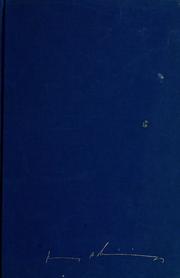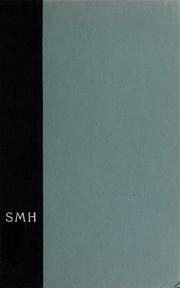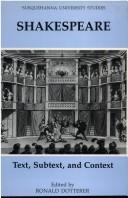| Listing 1 - 10 of 31 | << page >> |
Sort by
|
Book
Abstract | Keywords | Export | Availability | Bookmark
 Loading...
Loading...Choose an application
- Reference Manager
- EndNote
- RefWorks (Direct export to RefWorks)
Book
ISBN: 0297818945 Year: 1999 Publisher: London : Weidenfeld & Nicolson,
Abstract | Keywords | Export | Availability | Bookmark
 Loading...
Loading...Choose an application
- Reference Manager
- EndNote
- RefWorks (Direct export to RefWorks)
KISSINGER, HENRY ALFRED, 1923 --- BIOGRAPHY --- FORD, GERALD --- USA--FOREIGN RELATIONS
Book
ISBN: 0393055892 Year: 1976 Publisher: New York Norton
Abstract | Keywords | Export | Availability | Bookmark
 Loading...
Loading...Choose an application
- Reference Manager
- EndNote
- RefWorks (Direct export to RefWorks)
KISSINGER, HENRY ALFRED, 1923 --- BIOGRAPHY --- USA--FOREIGN RELATIONS --- United States --- Foreign relations --- 1969-1974 --- 1974-1977

ISBN: 0316496618 Year: 1979 Publisher: London : Little, Brown,
Abstract | Keywords | Export | Availability | Bookmark
 Loading...
Loading...Choose an application
- Reference Manager
- EndNote
- RefWorks (Direct export to RefWorks)
USA--FOREIGN RELATIONS --- NIXON, RICHARD MILHOUS, 1913 --- -KISSINGER, HENRY ALFRED, 1923 --- BIOGRAPHY
Book
ISBN: 1443898481 9781443898485 144389737X 9781443897372 Year: 2016 Publisher: Newcastle upon Tyne, England : Cambridge Scholars Publishing,
Abstract | Keywords | Export | Availability | Bookmark
 Loading...
Loading...Choose an application
- Reference Manager
- EndNote
- RefWorks (Direct export to RefWorks)
Kissinger, Henry, --- Kissinger, Henry Alfred --- Kīsinjar, Hinrī, --- Chi-hsin-chi, --- Kissinger, Henry Alfred, --- Kissinger, Henry A., --- Kissinker, Chenry, --- Kissinger, Heinz Alfred, --- Kisinker, Chenri, --- Kisintzer, Chenri, --- קיסינג׳ר, הנרי --- קיסינג׳ר, הנרי, --- קיסנג׳ר, הנרי, --- كسنگر، هنري،, --- 基辛格亨利, --- Cyprus --- History.

ISBN: 0671447602 Year: 1983 Publisher: New York Summit Books
Abstract | Keywords | Export | Availability | Bookmark
 Loading...
Loading...Choose an application
- Reference Manager
- EndNote
- RefWorks (Direct export to RefWorks)
#SBIB:327H15 --- #SBIB:328H31 --- Buitenlandse politiek: Noord-Amerika --- Instellingen en beleid: VSA / USA --- Kissinger, Henry, --- Kissinger, Henry Alfred --- Kīsinjar, Hinrī, --- Chi-hsin-chi, --- Kissinger, Henry Alfred, --- Kissinger, Henry A., --- Kissinker, Chenry, --- Kissinger, Heinz Alfred, --- Kisinker, Chenri, --- Kisintzer, Chenri, --- קיסינג׳ר, הנרי --- קיסינג׳ר, הנרי, --- קיסנג׳ר, הנרי, --- كسنگر، هنري، --- 基辛格亨利, --- United States --- Foreign relations --- 1969-1974 --- 1974-1977 --- كسنگر، هنري،,
Book
ISBN: 0233970770 9780233970776 Year: 1979 Publisher: London: Deutsch,
Abstract | Keywords | Export | Availability | Bookmark
 Loading...
Loading...Choose an application
- Reference Manager
- EndNote
- RefWorks (Direct export to RefWorks)
Cabinet officers --- Campaigns --- Biography --- Kissinger, Henry Alfred, --- Nixon, Richard Milhous, --- Cambodia --- United States --- History --- Politics and government --- 883.2 Oost-Azië --- Kissinger, Henry, --- Cabinet officers - Campaigns - United States - Biography --- Cabinet officers - United States - Biography --- Kissinger, Henry Alfred, - 1923 --- -Kissinger, Henry, - 1923 --- -Cambodia - History - Civil War, 1970-1975 --- United States - Politics and government - 1969-1974 --- -Cambodia
Book
ISBN: 9780674032521 0674032527 0674281942 0674281950 9780674281943 9780674281950 Year: 2009 Publisher: Cambridge, Mass. ; London : Belknap,
Abstract | Keywords | Export | Availability | Bookmark
 Loading...
Loading...Choose an application
- Reference Manager
- EndNote
- RefWorks (Direct export to RefWorks)
What made Henry Kissinger the kind of diplomat he was? What experiences and influences shaped his worldview and provided the framework for his approach to international relations? Suri offers a thought-provoking, interpretive study of one of the most influential and controversial political figures of the twentieth century.
Kissinger, Henry Alfred --- Kīsinjar, Hinrī, --- Chi-hsin-chi, --- Kissinger, Henry A., --- Kissinker, Chenry, --- Kissinger, Heinz Alfred, --- Kisinker, Chenri, --- Kisintzer, Chenri, --- קיסינג׳ר, הנרי --- קיסינג׳ר, הנרי, --- קיסנג׳ר, הנרי, --- كسنگر، هنري، --- 基辛格亨利, --- Cold War (1945-1989) --- Cold War. --- Statesmen --- World politics --- Kissinger, Henry, --- Kissinger, Henry Alfred, --- Political and social views. --- United States --- Foreign relations --- Philosophy. --- كسنگر، هنري،, --- Cold War
Book
ISBN: 0801447593 132250508X 080145977X 9780801447594 Year: 2010 Publisher: Ithaca : Cornell University Press,
Abstract | Keywords | Export | Availability | Bookmark
 Loading...
Loading...Choose an application
- Reference Manager
- EndNote
- RefWorks (Direct export to RefWorks)
In The Eccentric Realist, Mario Del Pero questions Henry Kissinger's reputation as the foreign policy realist par excellence. Del Pero shows that Kissinger has been far more ideological and inconsistent in his policy formulations than is commonly realized. Del Pero considers the rise and fall of Kissinger's foreign policy doctrine over the course of the 1970's-beginning with his role as National Security Advisor to Nixon and ending with the collapse of détente with the Soviet Union after Kissinger left the scene as Ford's outgoing Secretary of State. Del Pero shows that realism then (not unlike realism now) was as much a response to domestic politics as it was a cold, hard assessment of the facts of international relations. In the early 1970's, Americans were weary of ideological forays abroad; Kissinger provided them with a doctrine that translated that political weariness into foreign policy. Del Pero argues that Kissinger was keenly aware that realism could win elections and generate consensus. Moreover, over the course of the 1970's it became clear that realism, as practiced by Kissinger, was as rigid as the neoconservativism that came to replace it. In the end, the failure of the détente forged by the realists was not the defeat of cool reason at the hands of ideologically motivated and politically savvy neoconservatives. Rather, the force of American exceptionalism, the touchstone of the neocons, overcame Kissinger's political skills and ideological commitments. The fate of realism in the 1970's raises interesting questions regarding its prospects in the early years of the twenty-first century.
Conceptualism --- Kissinger, Henry Alfred --- Kīsinjar, Hinrī, --- Chi-hsin-chi, --- Kissinger, Henry A., --- Kissinker, Chenry, --- Kissinger, Heinz Alfred, --- Kisinker, Chenri, --- Kisintzer, Chenri, --- קיסינג׳ר, הנרי --- קיסינג׳ר, הנרי, --- קיסנג׳ר, הנרי, --- كسنگر، هنري، --- 基辛格亨利, --- Conservatism --- Realism --- Empiricism --- Philosophy --- Universals (Philosophy) --- Dualism --- Idealism --- Materialism --- Nominalism --- Positivism --- Rationalism --- Political aspects --- Kissinger, Henry, --- Kissinger, Henry Alfred, --- United States --- Foreign relations. --- Foreign relations --- كسنگر، هنري،,

ISBN: 0838751474 Year: 1989 Publisher: Lewisburg London Toronto Bucknell University Press Associated University Presses
Abstract | Keywords | Export | Availability | Bookmark
 Loading...
Loading...Choose an application
- Reference Manager
- EndNote
- RefWorks (Direct export to RefWorks)
327 <73> --- Kissinger, Henry --- United States --- Foreign relations --- -Philosophy. --- -United States --- Philosophy --- 1945-1989 --- Kissinger, Henry, --- Kissinger, Henry Alfred --- Kīsinjar, Hinrī, --- Chi-hsin-chi, --- Kissinger, Henry Alfred, --- Kissinger, Henry A., --- Kissinker, Chenry, --- Kissinger, Heinz Alfred, --- Kisinker, Chenri, --- Kisintzer, Chenri, --- קיסינג׳ר, הנרי --- קיסינג׳ר, הנרי, --- קיסנג׳ר, הנרי, --- كسنگر، هنري، --- 基辛格亨利, --- Philosophy. --- كسنگر، هنري،,
| Listing 1 - 10 of 31 | << page >> |
Sort by
|

 Search
Search Feedback
Feedback About UniCat
About UniCat  Help
Help News
News